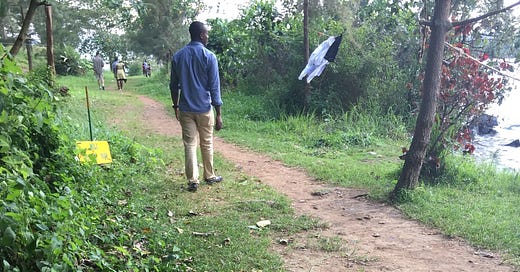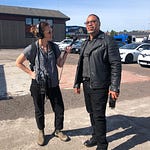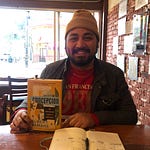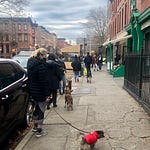Sonia Paul 00:10
Hello, everyone, welcome to Loitering, the occasional but lovable traveling mini pod I am currently testing in newsletter format. And today I am loitering at a clowning event** in Berkeley with two very special guests. Can you please introduce yourself?
Hannah Gaffe 00:27
My name is Hannah Gaff.
Joan Howard 00:29
My name is Joan Howard.
Sonia 00:30
And could you tell me what is going on here right now at this event and — I mean, the listeners can't see how you're dressed, but like, what is your presentation right now?
Joan 00:41
Is there something wrong with how I'm dressed?
Hannah 00:42
Yeah. What's the uh — is it?
Joan 00:44
I don't know. I think I look quite nice.
Hannah 00:45
Well, the title of this event is clown fundraiser, fun — fundraiser and silent auction.
00:56
(Shh. Sorry. Sshh — Be quiet! No. Okay. But I am trying. I'm talking. Okay.)
Hannah 01:07
And ClownCorps is our organization, and we're holding this event.
Joan 01:11
It's very heavy.
Hannah 01:12
It's a heavy event.
Joan 01:13
It's a very heavy event, but we're gonna hold it.
Hannah 01:15
We're holding it with our spirit.
Sonia 01:17
So what is the heaviness of what's happening right now? Can you elaborate a little bit?
Joan 01:23
That was good that — that was a really good transition. Well, it's a heavy time with the coronavirus, of course, becoming officially labeled a pandemic, and information coming from every which way, and a lot of anxiety and a lot of unknowns. And I, you know, speak for myself when, you know, I also say, it's really hard to live when you don't actually know if you're gonna go to work the next day, or if you're going to suddenly have to stay in your house. I mean, there's just a lot of unknowns. And it's especially scary for people who are at more risk, and it's just I think there's a lot of fear. It's just a lot fear.
Sonia 02:00
And what is the significance of clowning in this sort of tension? Because I think like, a lot of people don't really think about clowns beyond like, you know, maybe the movie It, or like Circus Circus.
Joan 02:12
Which, I would just like to point out, It is not a clown. It is, in fact, an alien (playing a clown) wearing a specific kind of clown costume.
Hannah 02:20
And in the book, he also wears other costumes.
Joan 02:23
Yes, he's not just a clown, just to be clear. He's still an alien.
Sonia 02:26
But that has sort of framed our perception of the clown. So what is the kind of frame that you're trying to push forward right now, especially in these times?
Hannah 02:35
So the clown, we believe the clown creates space, holds space, for people to experience what is happening in an open, public way, or in a way between two people. Between many people. And so, as clowns, we open up community space, and we open up direct communication between people, and we create a space in which people feel like they can play and laugh and feel released through laughter.
Joan 02:58
At things that seem unlaughable. Like that has always been the clown's role, like, from sort of day one, the clown shows up and creates a space in which people can laugh at what feels on unlaughable.
Hannah 03:09
Being able to laugh at things that are hard brings resilience.
Sonia 03:14
Yeah, but what about the sort of pushback that, you know, let me just play devil's advocate here. Like, maybe we shouldn't be laughing at something that's truly horrible. What if we're making lighthearted of a situation that really deserves our concentration and the full scrutiny that maybe members of our government aren't giving it, that we also need to offer that in response?
Joan 03:39
I would say that they're not mutually exclusive. And I think that laughter actually allows people to have some relief so that they can have more energy and more resilience to be able to then do the hard work. Because if you stay all of the time in the hard and the heavy, it becomes really difficult to move forward doing the hard work. So the laughter is actually a release. It's a relief. It brings energy. It also in this time where people are isolating for very important and good reasons, we also need to be in human contact of some kind, and we need to feel like a part of a community. And the clown also as a buoyant, connecting spirit offers that space as well. And um, just to be clear, we at this gathering do have the CDC on hand. We called the CDC, the Clown Disinfectant Committee, and they're here in full regalia with sanitizer sprays and tips on social distancing.
Sonia 04:38
You alluded to this earlier that the clown is the space between what we know and what we don't know. Can you elaborate on that?
Joan 04:48
Yeah, so the clown, unlike humans, who think about the future and remember the past, the clown shows up in every moment, is like, "I'm here! What now? Ooh, what's happening now? Oh, happening? What's happening now? Oh, that thing! And they respond very directly to the thing that's happening right in front of them. So it allows for a fresh take and a buoyant perspective on things that get really bogged down by past and future.
Hannah 04:50
And also, to be clear, the clown is very much in the moment experiencing what is happening. So the clown doesn't ignore this big thing that's happening right now, this, this really, you know, anxiety-inducing thing. The clown acknowledges it, and in fact, can be very deeply impacted by it. And in the face of that is still a clown, and still moves through it with failures, celebrating their failures, bouncing off of the hard things, bouncing right back up to the top, and then bringing people that laughter, which brings some resilience, so.
Joan 05:45
And also reminding us all as humans that we all have resilience and buoyancy, and like, this is the time in which we really need to find and remember our resilience and our buoyancy so we can continue to be humans together, and love one another and find a way to connect, even though we're also having to protect ourselves and take care and find ways to take care of one another's community.
Sonia 06:05
Is there anything else you would like to add?
Joan 06:08
I think I just want to go back a moment to the "laughing at," because I just want to be clear that clowns don't laugh at. They laugh. They laugh with what's happening, and play. So a clown plays. It's like, they see something. And they find the joy through their naivete and their curiosity and their wonder. And so therefore, they can invite other people to be in that space with them, and also find the wonder and the curiosity and the delight. And the laughter comes from that shared space. Not like, pointing out a thing and making fun of it. Yeah.
Sonia 06:46
And um, where should we look for clowns in our lives if we don't have like, regular events that, you know, we can come to to find these clowns?
Joan 06:54
Well, you can be a clown in your life.
Hannah 06:56
In fact, you probably already are.
Joan 06:59
Everyone is a clown. Really.
Hannah 07:03
We like to be clowns all the time, not just when we have our red nose on, because of the fact that we interact with the world in a more curious and open way. But you can check out our website, which is found ClownCorps.org. We offer workshops regularly. We really love meeting people and their clowns. And yeah, we're just excited to share some more clown love.
Joan 07:26
I have one more thought. Going back to, you asked what a clown was. And then I was like, "Ah, there's a phone in my face." So we have a teacher named Giovanni Fusetti, who talks about sublime stupidity, and that each one of us has our own unique silliness inside of us. And that a clown is an amplified version. It's a human who's amplified, so that our core and sort of most essential sublime stupidity gets to come out and play. And it's in this space, where we can connect very joyfully and very deeply with one another.
Sonia 08:02
That's so beautiful, thank you. And it is -- it's quite calming to me, in this moment. So, that's all we have for today of Loitering, the occasional but lovable traveling mini pod I am currently testing in newsletter format. Thank you for listening and have a great day. Goodbye!
**This clowning event in Berkeley was to fundraise for ClownCorps’ international social clowning tour in Bali. Their schedule is up in the air because of COVID-19, but if you would like more information on the point and scope of the tour, you can find that here.
Some useful links for these times:
The Dos and Don’ts of ‘Social Distancing, The Atlantic
Taking Care of Your Mental Health in the Face of Uncertainty (thank you to my sister and psychologist Christine Paul for sharing)
I Lived Through SARS and Reported on Ebola. These Are the Questions We Should Be Asking About Coronavirus., by Caroline Chen
Notes from a UCSF Expert panel — March 10. Some of these statistics — what could happen WITHOUT coordinated effort to stop the spread of COVID-19 — are truly sobering. But that’s why we all need to take the necessary precautions to stay healthy and look out for one another.













Share this post